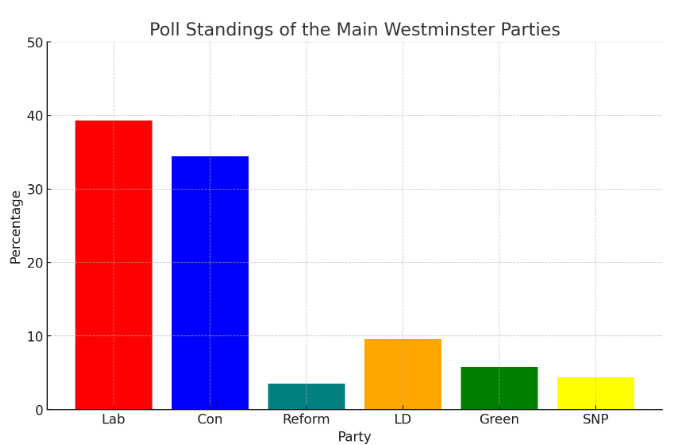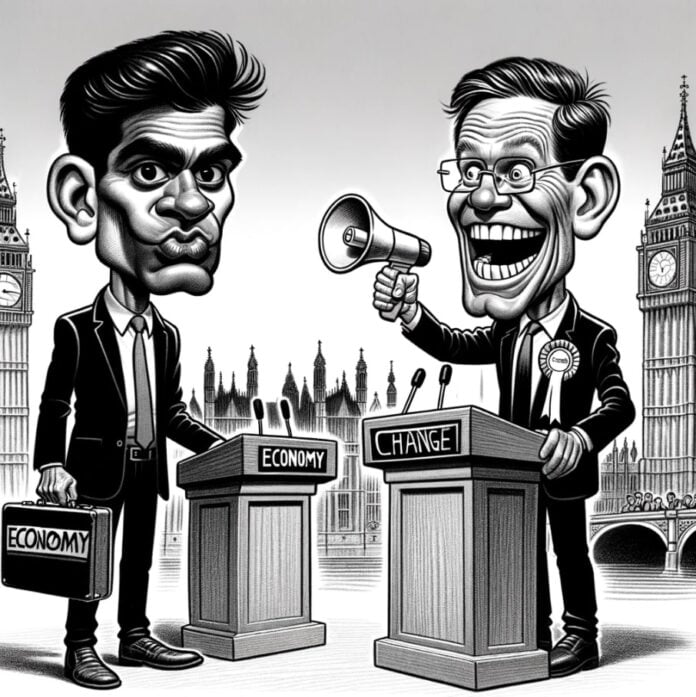The UK political landscape is heating up as the country heads towards a general election on July 4, 2024. The latest opinion polls show a tight race, with Labour, led by Keir Starmer, currently ahead with 39.3% of the vote, while the Conservatives, led by Prime Minister Rishi Sunak, trail at 34.4%.

Starmer Blasts Tories Over Economic Mismanagement
Labour leader Keir Starmer has taken a firm stance against the Conservative government’s handling of the economy, highlighting the brief yet impactful tenure of former PM Liz Truss. Truss’s mini-Budget, which included £45bn of unfunded tax cuts, triggered economic turmoil that has left lasting scars on many families.
Starmer recounted the story of a family that decided against having a second child due to the economic instability caused by Truss’s policies, emphasising the long-term consequences of the Conservatives’ economic decisions. “They will live with that decision for the rest of their lives,” Starmer said, underscoring the personal impact of governmental missteps. He further accused the current government of making a “mess” of the economy and urged voters to “end the chaos” and “rebuild Britain.”
Sunak’s Immigration Policy and Election Strategy
On the other side of the political spectrum, Prime Minister Rishi Sunak has focused his campaign on immigration, specifically the controversial Rwanda deportation scheme. Sunak has stated that no asylum seekers will be sent to Rwanda before the election, but promises to initiate the flights if re-elected. This policy, which has already cost £240m and faced numerous legal challenges, is a key dividing line between the Conservatives and Labour, with the latter pledging to scrap the plan if they win power.
Sunak has framed the election as a choice between his party’s commitment to economic stability and security versus Labour’s approach, which he claims will lead to increased taxes. “More spending equals more taxes,” Sunak argued, highlighting his party’s tax-cutting measures as beneficial for families.
Nigel Farage and Reform UK
Adding to the complexity of the election, Nigel Farage, founder of Reform UK, announced he will not stand as a candidate. Despite this, Farage promised to support his party’s campaign, which targets disillusioned Conservative and Labour voters with its radical agenda on immigration and net zero policies.
Election Campaign Underway
Campaigning is in full swing, with both major party leaders hitting the trail to garner support. Sunak’s unexpected call for a summer election has surprised many, setting the stage for a historic and highly competitive race.
Starmer has positioned Labour as the party of change, promising to “stop the chaos” and restore order in various sectors, from healthcare to law enforcement. Meanwhile, Sunak is doubling down on his achievements and future plans, presenting himself as the candidate of stability and continuity.
As the election date approaches, the political landscape remains dynamic, with key issues such as the economy, immigration, and party leadership at the forefront of the debate. Stay tuned for more updates as the campaign progresses.
Further Reading:




